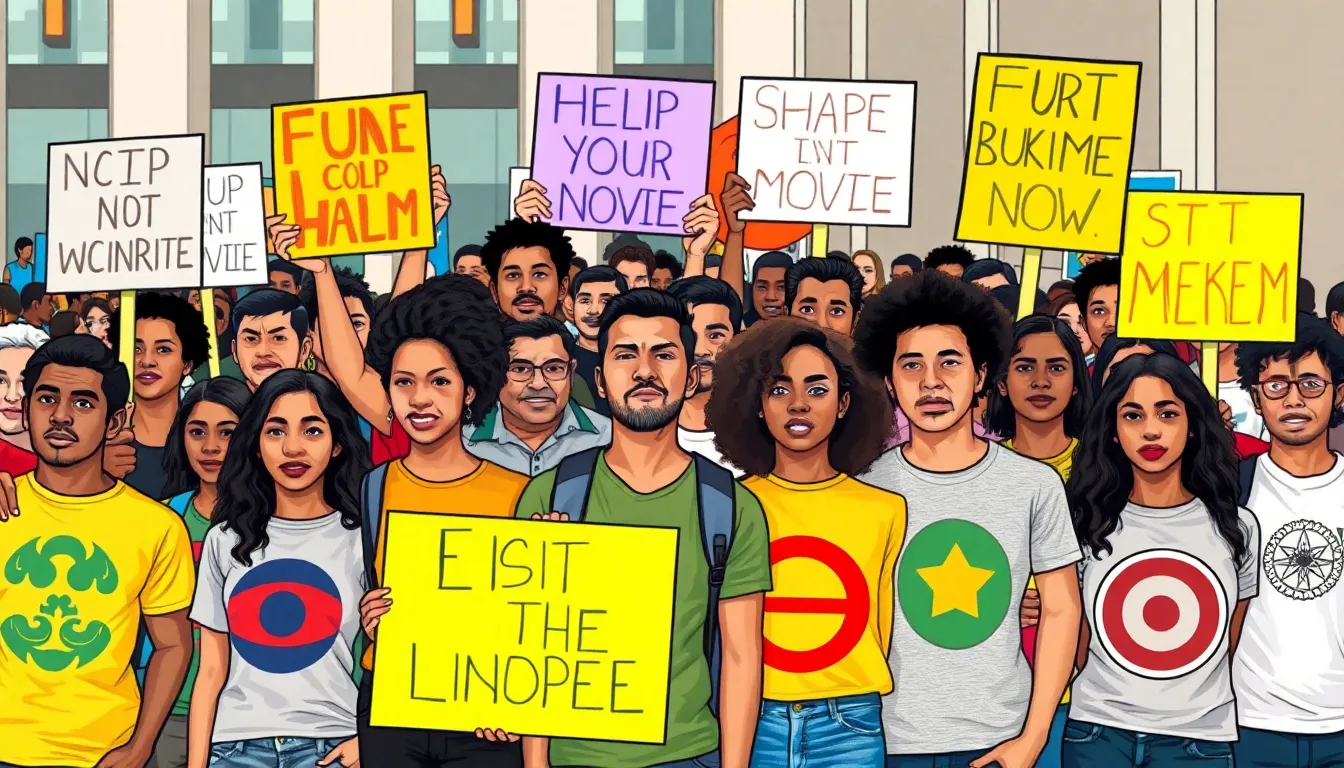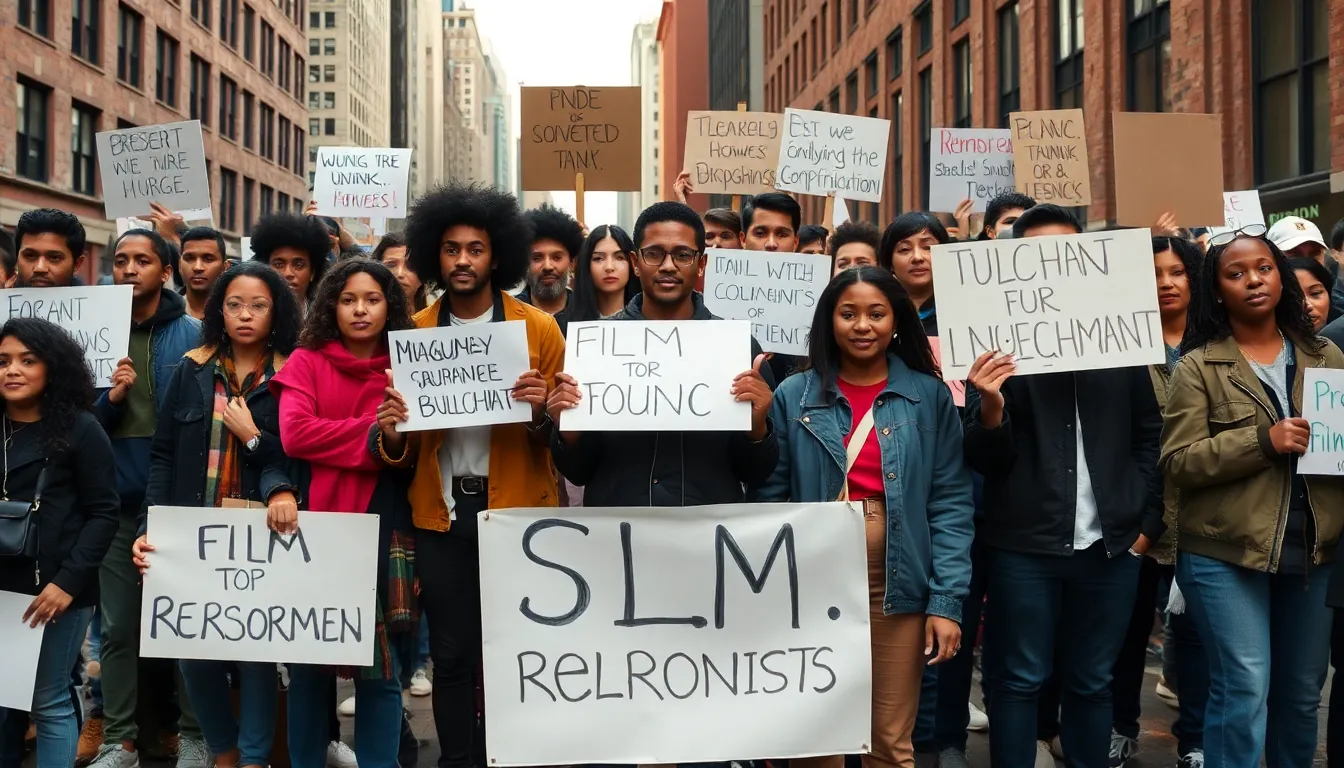Table of Contents
ToggleIn a world where opinions clash louder than a popcorn machine at a blockbuster premiere, the concept of a “boycott movie” has taken center stage. Picture this: a film so controversial it sparks heated debates in living rooms and social media feeds alike. It’s not just a flick; it’s a call to action, a chance for audiences to flex their collective muscles and make a statement.
But what exactly does it mean to boycott a movie? Is it simply a matter of refusing to buy a ticket, or does it involve a deeper commitment to the values we hold dear? As viewers navigate the cinematic landscape, the reasons behind these boycotts can be as varied as the films themselves. Buckle up as we dive into the colorful world of boycott movies and explore why they matter more than ever.
Understanding Boycott Movies
Boycott movies resonate in contemporary culture, stirring debates over personal values and societal issues. Audiences often engage deeply with the idea of supporting or rejecting films based on their themes or creators.
Definition and Context
Boycott movies refer to films that prompt audiences to avoid viewing due to ethical concerns. A variety of factors contribute to boycotting, including the filmmaker’s past actions, political stances, or controversial themes. Individuals may choose to boycott as a means of expressing dissatisfaction. Decisions against attending a film can reflect broader social movements. Such actions emphasize an audience’s desire for accountability and moral alignment with their entertainment choices.
Historical Significance
The practice of boycotting films holds historical importance, tracing back to early movements against racial and social injustices. Activist groups often rallied against movies perceived as perpetuating stereotypes. In more recent history, significant boycotts have emerged in response to gender representation and diverse storytelling. Events like these highlight shifts in public sentiment and the growing influence of marginalized voices. Understanding these past actions frames the current landscape, showcasing how consumer power shapes the film industry.
Reasons Behind Boycotting Movies

Boycotting movies stems from various cultural and social reasons, reflecting viewers’ values and beliefs. Audiences often engage in boycotts to express their discontent over specific issues.
Cultural Sensitivity
Cultural sensitivity plays a significant role in movie boycotts. Audiences react negatively when films misrepresent or stereotype diverse communities. Cultural appropriation can also ignite backlash, particularly when filmmakers exploit traditions without proper representation. There are instances where films depict harmful tropes, leading certain groups to rally against their release. Activists often create campaigns on social media to raise awareness and promote discussion, amplifying their voices.
Social Issues
Social issues frequently drive boycotts of films, aligning with evolving public sentiments. Productions that address racism, gender inequality, or LGBTQ+ rights can spark backlash based on perceived insensitivity. For instance, films that neglect representation or appropriate narratives face criticism. Protest movements sometimes arise in response to filmmakers’ off-screen actions, further igniting public outrage. Social media amplifies these reactions, allowing citizens to coordinate efforts and create collective action.
Notable Boycott Movies in History
Notable boycott movies have often sparked significant discussions in film culture. These films usually highlight contentious issues, prompting audiences to take a stand.
Examples and Impact
Various films faced backlash for their content and the controversies surrounding them. Gone with the Wind generated boycotts due to its depiction of slavery, resulting in protests and discussions about historical representation. American Sniper faced criticism for its portrayal of the Iraq War, leading some to call for boycotts based on its political implications. These examples show how audiences react strongly, impacting box office sales and production approaches. Filmmakers frequently reassess their narratives after observing these reactions.
Reactions and Outcomes
Reactions to boycott movies vary widely. Fans often engage in discussions across social media platforms, influencing broader conversations. In some cases, boycotts lead to successful campaigns demanding changes or accountability. For instance, The Hunt faced a delayed release due to backlash, prompting the studio to rethink its marketing strategy. Boycotting a film sometimes results in lasting effects on an actor’s or filmmaker’s career, demonstrating the power of consumer choice. Activist voices continue to shape the industry landscape through these collective reactions.
The Role of Social Media
Social media plays a crucial role in boycotting movies, driving conversations and mobilizing audiences. Platforms enable users to share their opinions quickly and broadly, allowing movements to take root almost instantly.
Mobilization and Awareness
Activists leverage social media to organize campaigns effectively. They create hashtags that resonate, drawing attention to specific issues surrounding a film. Facebook groups and Twitter threads facilitate discussions, engaging audiences about why a boycott is necessary. Movements gain momentum as supporters amplify their messages, often resulting in trending topics that catch the attention of industry leaders. Potential viewers frequently learn about controversial films through these platforms, influencing their purchasing decisions and inviting wider audience participation.
Case Studies of Successful Boycotts
Several boycotts demonstrate the power of social media. The backlash against “The Hunt” illustrates how online protest can lead to significant changes. Organized campaigns generated enough outcry to delay its release. “American Sniper” faced scrutiny as social media users highlighted its controversial portrayal of war. Various groups voiced dissent, pressuring the filmmakers and studios to reconsider their narratives. These examples show how social media not only sparks awareness but also showcases its direct impact on film production and audience dynamics.
Boycott movies serve as a powerful reflection of societal values and the changing landscape of cultural representation. As audiences become more aware of the implications behind their entertainment choices, the impact of boycotting resonates beyond individual films. This collective action not only influences filmmakers but also shapes industry standards, prompting a reevaluation of how stories are told and who tells them.
The role of social media in this phenomenon cannot be overstated, as it amplifies voices and mobilizes communities around shared values. Ultimately, the conversation around boycott movies will continue to evolve, highlighting the importance of ethical considerations in film and the responsibility of creators to engage with their audiences thoughtfully.




